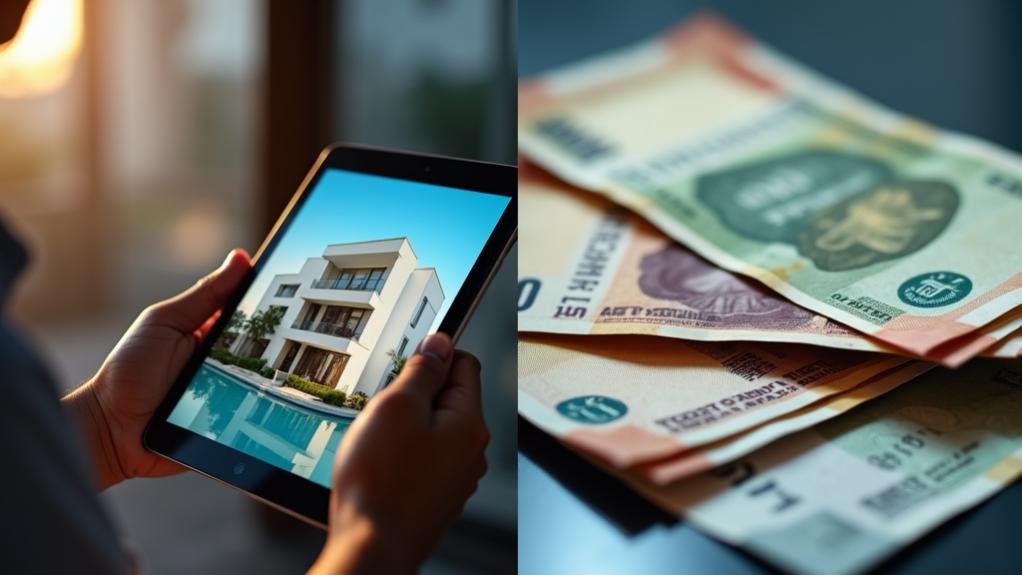Money Transfer Process for Buying a Property in Dubai From India

When considering purchasing property in Dubai from India, understanding the money transfer process is essential. You’ll need to navigate regulations like FEMA and utilize the Liberalized Remittance Scheme to remit funds efficiently.
It’s important to ensure all your documentation, including Form 15CA and Form 15CB, is in order. Choose a secure transfer method, whether through a bank or a service like TransferWise.
Have you considered how tax implications and additional fees might affect your investment? Let’s explore how to manage these potential hurdles effectively.
Key Takeaways
- Use bank transfers or services like TransferWise for secure, efficient international transactions from India to Dubai.
- Comply with FEMA guidelines and LRS, allowing remittances up to $250,000 annually for property purchases.
- Submit Form 15CA and Form 15CB to ensure tax compliance with Indian regulations before transferring funds.
- Verify the recipient’s eligibility to receive funds in Dubai to facilitate a smooth transaction process.
- Avoid mobile wallets, cryptocurrencies, and cash transfers for large property transactions due to security concerns.
Understanding LRS and FEMA Regulations
Let us help you find the perfect property. Contact us to get started.

When purchasing property in Dubai, adhere to the Foreign Exchange Management Act (FEMA) guidelines to ensure all transactions comply with Indian regulations. The Liberalized Remittance Scheme (LRS) permits remittances up to $250,000 per financial year.
The Reserve Bank of India (RBI) prohibits borrowing foreign currency for overseas property purchases. Understand permissible transactions under LRS, including property purchases, and comply with tax obligations in both India and Dubai.
Property acquisition through inheritance or gift must also adhere to foreign exchange provisions. It’s essential to verify the recipient’s eligibility to receive funds in Dubai to ensure a smooth transaction process.
Ensure that all necessary documentation, such as Form 15CA and Form 15CB, is submitted to certify tax compliance with Indian regulations. No special permissions are required for designated freehold areas in Dubai.
Required Documentation
To navigate property acquisition in Dubai, ensure you have the necessary documents: a valid passport, PAN card, proof of address, and verification of residency status. For property transactions, obtain the sale agreement, title deed, and a No-Objection Certificate from the developer.
If buying through a company, include incorporation documents. Financial documents needed are Form 15CA, Form 15CB, proof of tax compliance, and bank statements showing sufficient funds. Secure a chartered accountant’s certificate for FEMA compliance and declare the nature of remitted funds.
Given the booming market with 31,920 transactions worth 147 billion AED in Q4 2023, it is crucial to ensure all paperwork is meticulously prepared to avoid any delays.
Include Double Taxation Avoidance Agreement documentation if applicable, and ensure all forms, especially Forms 15CA and 15CB, are signed and acknowledged.
Transfer Methods

Once you’ve gathered the necessary documentation for purchasing property in Dubai, consider the transfer methods. Bank transfers are secure and supported by UAE banks for direct remittance to Indian banks, though they may incur higher fees and take a few days to a week.
Alternatively, online services like TransferWise and Xoom offer competitive rates, lower fees, and faster processing with real-time exchange rates for transparency. Exchange houses such as UAE Exchange provide efficient services and favorable rates.
For large transactions, avoid mobile wallets, cryptocurrencies, and cash transfers due to security and compliance concerns. Always ensure legal regulations are followed.
Additionally, wire transfers from local banks to HDFC Bank accounts in India provide a secure method for sending money internationally, making them a reliable option for large transactions.
Tax Considerations
As an Indian resident buying property in Dubai, consider the following tax aspects:
Under the Liberalised Remittance Scheme (LRS), you can remit up to $250,000 annually, ensuring funds are from declared income sources on your tax returns. It’s crucial to adhere to these LRS guidelines to avoid any penalties.
A 20% TCS applies for remittances over ₹7 lakh, causing temporary cash blockage.
Disclose the Dubai property in your income tax return’s Foreign Asset schedule to avoid penalties under the Black Money Act.
Report rental income from Dubai in the Foreign Source Income schedule; it’s taxable in India, but you can claim a foreign tax credit for taxes paid.
Comply with FEMA regulations and provide necessary documentation, including tax certificates and Form 15CA/15CB for TDS.
Ensuring Compliance With RBI Guidelines

When purchasing property in Dubai, consider additional costs like government and administrative fees: a 4% transaction fee and AED 4,000 property registration fee plus 5% VAT for properties over AED 500,000.
It’s essential to factor in the Dubai Land Department (DLD) fees, which are set at 4% of the purchase price, as these can significantly impact your budget. Mortgage registration is 0.25% of the loan amount plus VAT.
Real estate transactions also include a conveyancing fee of AED 7,500 and a brokerage commission, typically AED 42,000. Mortgage costs feature a 1% arrangement fee plus 5% VAT. Lastly, account for property maintenance costs, such as DEWA setup at AED 4,000, and ongoing service charges.
Frequently Asked Questions
How Long Does the Entire Buying Process Take From Start to Finish?
The entire buying process typically takes 5-9 weeks. You’ll research and select properties, finalize agreements, transfer ownership, and complete handover procedures. Confirm all legal, financial, and registration steps are meticulously followed for a smooth transaction.
Can I Purchase a Property Jointly With a Family Member?
Yes, you can jointly purchase property with eligible family members like spouses, parents, or children. Guarantee compliance with UAE’s regulations by providing required documents: passport, NOC, sale agreement. Understand financial obligations and legal implications of joint ownership structures.
What Are the Steps to Ensure the Developer’s Credibility in Dubai?
You should verify the developer’s licensing, assess financial stability, evaluate their track record, and confirm compliance with regulations. Use RERA and Madmoun services for due diligence, ensuring no past violations or financial red flags exist.
Are There Any Legal Restrictions on Renting Out the Property in Dubai?
You must register the lease with RERA via Ejari. Confirm rent payments comply with due dates. Adhere to regulations on rent increases. Maintain property condition. Obtain consent for alterations. Follow notification rules for tenancy termination.
What Should I Do if I Encounter Issues With the Property Post-Purchase?
If you encounter post-purchase issues, immediately document defects, consult Dubai’s Real Estate Regulatory Authority, and review the purchase agreement. Engage legal counsel to assess potential claims under UAE property laws for compensation or resolution.
Conclusion
When buying property in Dubai from India, ensure full compliance with FEMA guidelines. Utilize the Liberalized Remittance Scheme for transfers up to $250,000 annually.
Prepare and submit Form 15CA and Form 15CB to address tax obligations. Opt for secure bank transfers or reliable online services like TransferWise.
Verify the recipient’s eligibility to receive funds in Dubai. Account for any additional costs and fees to guarantee a seamless and legally sound transaction.
Let us help you find the perfect property. Contact us to get started.






